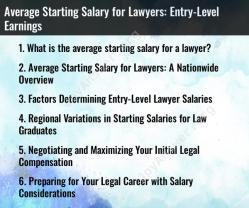How much do lawyers really earn?
The earnings of lawyers can vary significantly depending on various factors, including their location, experience, specialization, the type of law they practice, and whether they work in private practice, government, or the corporate sector. Here's an overview of the range of earnings for lawyers:
Location: Earnings can vary by country, state, and city. Lawyers practicing in major metropolitan areas often command higher salaries than those in smaller towns or rural areas due to differences in the cost of living and demand for legal services.
Experience: Junior or newly licensed attorneys typically earn less than their more experienced counterparts. As lawyers gain experience and build a reputation, their earnings tend to increase.
Type of Practice:
- Private Practice: Lawyers in private practice, especially those in large law firms or specialized boutique firms, can earn substantial incomes. Partners at prestigious law firms can earn high six or seven-figure incomes. Solo practitioners or lawyers at small firms may earn less, especially in the early years of their practice.
- Government Lawyers: Attorneys working in government positions, such as public defenders, prosecutors, and government agencies, often earn competitive salaries with benefits and job security. These salaries may be lower than those in private practice but are more stable.
- In-House Counsel: Lawyers employed by corporations as in-house counsel can earn substantial salaries, especially in larger companies. The earnings can vary depending on the industry and the size of the company.
- Nonprofit and Public Interest: Lawyers working for nonprofit organizations or in public interest law may earn less than their private-sector counterparts but find fulfillment in their work.
Specialization:
- Lawyers who specialize in high-demand areas like corporate law, intellectual property, tax law, or healthcare law may command higher salaries due to their expertise.
- Public interest lawyers, family law attorneys, and some criminal defense lawyers may earn more modest incomes compared to highly specialized areas.
Work Hours:
- The number of hours worked can impact earnings. Lawyers who work long hours, including overtime, may earn more than those who work part-time or have reduced schedules.
Bonuses and Benefits:
- In addition to base salaries, many lawyers receive performance-based bonuses and benefits such as health insurance, retirement contributions, and other perks.
Industry and Sector:
- Lawyers working in certain industries, such as finance or technology, may command higher salaries due to the specialized legal knowledge required in these fields.
Job Market Conditions:
- The job market for lawyers can fluctuate, affecting earning potential. Economic conditions and changes in legal demand can impact the availability of high-paying positions.
It's important to note that while some lawyers earn high incomes, there is also a wide range of earnings within the legal profession. Entry-level salaries for new attorneys can be modest compared to those with several years of experience. Additionally, lawyers often accrue substantial student loan debt from their legal education, which can influence their financial situation.
Overall, the earnings of lawyers are diverse, and individual salaries can vary considerably based on multiple factors, as well as personal choices and career trajectories.
Exploring Lawyer Salaries: Earnings and Factors Affecting Income
The legal profession is known for its high salaries, but there is a wide range of earnings among lawyers. The median salary for lawyers in the United States in 2021 was $127,990, according to the Bureau of Labor Statistics. However, the top 10% of earners made more than $208,000, while the bottom 10% made less than $54,910.
A number of factors can affect a lawyer's salary, including:
- Field and specialization: Lawyers in certain fields and specializations, such as corporate law and intellectual property law, tend to earn higher salaries than lawyers in other fields.
- Location: Lawyers in major cities, such as New York and Los Angeles, tend to earn higher salaries than lawyers in smaller towns and rural areas.
- Experience: Lawyers with more experience tend to earn higher salaries than lawyers with less experience.
- Employer type: Lawyers who work for large law firms tend to earn higher salaries than lawyers who work for small law firms or who are self-employed.
The Range of Salaries in the Legal Profession
The range of salaries in the legal profession is quite wide. According to the National Association for Law Placement (NALP), the median starting salary for lawyers in private practice in 2022 was $190,000. However, the starting salary range for associates in large law firms was $160,000 to $215,000, while the starting salary range for associates in small law firms was $60,000 to $100,000.
Lawyers who work for the government or for non-profit organizations typically earn less than lawyers who work in private practice. However, there are some government and non-profit jobs that pay very well, such as jobs as prosecutors and public defenders.
High-Earning Fields and Specializations in Law
Some of the highest-earning fields and specializations in law include:
- Corporate law
- Intellectual property law
- Securities law
- Tax law
- Real estate law
- Trial law
- Medical malpractice law
- Personal injury law
- Divorce law
- Criminal law
Location and Experience's Influence on Lawyer Earnings
Location and experience can also have a significant impact on lawyer earnings. Lawyers who work in major cities tend to earn higher salaries than lawyers who work in smaller towns and rural areas. Additionally, lawyers with more experience tend to earn higher salaries than lawyers with less experience.
Pursuing a Legal Career with Salary Expectations in Mind
If you are considering a career in law, it is important to be realistic about your salary expectations. The legal profession is competitive, and it can take time and effort to build a successful career. However, with hard work and dedication, it is possible to achieve a high salary in the legal profession.
Here are a few tips for pursuing a legal career with salary expectations in mind:
- Choose a field and specialization that is in high demand and that is known for paying well.
- Attend a top law school and get good grades.
- Gain experience by working as a summer associate at a law firm or by clerking for a judge.
- Network with other lawyers and professionals in the legal field.
- Be prepared to negotiate your salary when you are offered a job.
By following these tips, you can increase your chances of landing a high-paying job in the legal profession.





